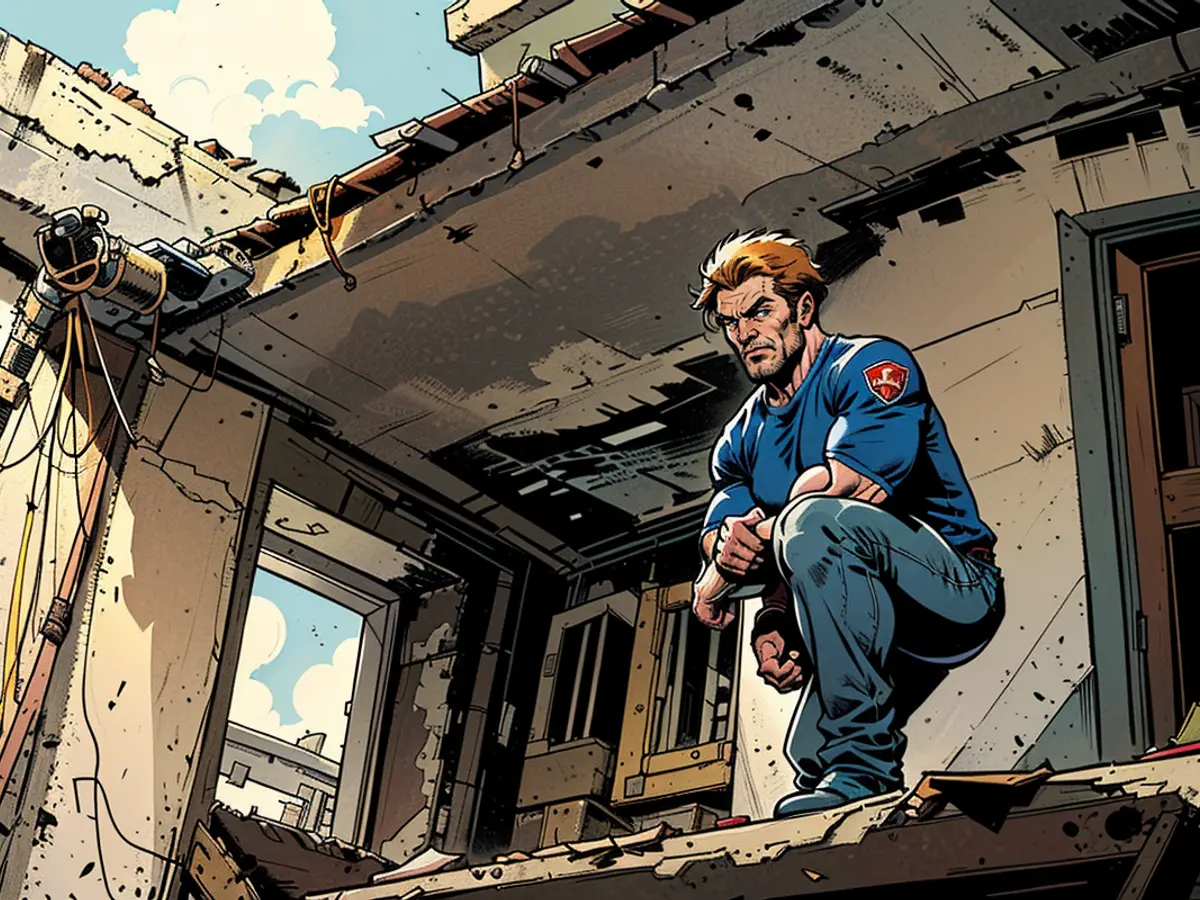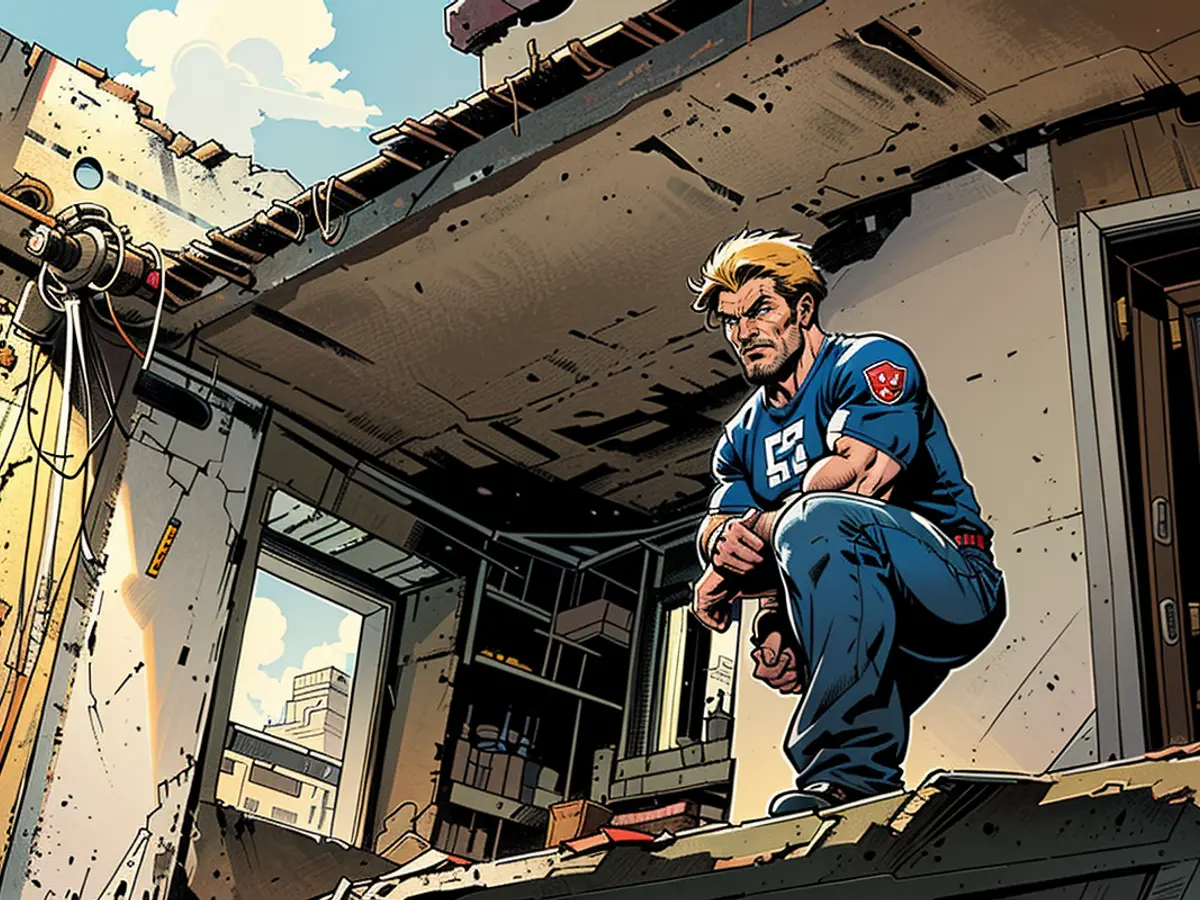For the first time, Ukraine encounters Russia's most advanced fighter aircraft.
For the first instance, Ukraine's military intelligence reports a successful attack on a Su-57 fighter jet. The aircraft was damaged during an attack on an airfield in the Astrakhan region in southern Russia which is nearly 600 kilometers from the border. Pictures from satellites show the jet unharmed on Friday, but ruined due to explosions on Saturday. Recently, Russia disclosed a drone attack on numerous areas, including Astrakhan. The Su-57 is Russia's most modern fighter aircraft that can also carry missiles. A few have been used in combat.
10:11 ISW: Russian soldiers cannot handle a massive summer assaultRussia brings in 30,000 soldiers per month, some of whom get deployed as reinforcements on the frontlines. According to an evaluation from the US Institute for War Studies (ISW), this reinforcement will not suffice to perform large-scale offensive operations on multiple fronts in the summer. The reserves would not be appropriate for being first or second line troops. However, this is a must for a large offensive.
09:27 UN: At least 174 Ukrainian civilians were killed in MayIn May, at least 174 civilians perished and 690 were injured in Ukraine. This is the greatest monthly figure of civilian casualties in a year, as mentioned by the UN mission in Ukraine. The increased casualties can be credited to the fierce attacks from Russian troops in the Kharkiv region. More than half of the victims were from this part of the country.
08:50 Ukraine: Russians organize training programs for officers in occupied regionsRussia intends to provide courses for training officers in the presently captured areas of Ukraine. This is reported by the Kyiv Post, as well as a document by Ukrainian Special Forces. These officers will be offered "optimal job offers within the framework of a contract". The courses revolve around electronic warfare, involving radar and jamming devices. The Russian army uses jamming devices frequently, to a large extent that Western precision weapons often cannot reach their intended target.
08:19 Ukrainian General Staff lists 1,270 Russian lossesThe Ukrainian General Staff has accounted for 1,270 Russian soldiers who are either dead or wounded in the past 24 hours. The total number of losses since the start of the full-scale invasion, as per the Ukrainians, has now surpassed 518,000. Since yesterday, 26 Russian tanks have been razed, the same number of armored vehicles, 60 artillery systems, and two air defense systems. The loss of drones is specified as 37 by the General Staff.
07:40 Ukrainians repel Russian advances in the northRussia has been beefing up their troops behind Ukraine's northeastern border for some time. Wozhansk near Kharkiv has been under shelling for weeks and it is foreseen that a larger attack in the region will ensue. Nevertheless, it looks that the Ukrainians are managing to hold off the Russian advances there.
07:27 NATO considers a permanent ambassador in Kyiv, assistance to become more dependableThe NATO is considering setting up a position for a permanent ambassador in Kyiv. This "high-level civilian representative" would manage NATO's support for Ukraine, including the military aid from Western countries. This unit will work similarly to the role the NATO played for twenty years during its presence in Afghanistan. The reason for the planning of an ambassador stems from the prediction that at the NATO summit in July in Washington, the nations are unlikely to endorse Ukraine's invite to initiate accession talks. Consequently, the alliance is currently looking for steps that are not as substantial as this commitment, but could nevertheless bring them closer to Kyiv and make aid more binding.
06:55 Ukraine aims to have more direct talks with arms manufacturersThe Ukrainian government is implementing a new tactic in terms of collaborating with arms manufacturers, according to its own declaration. The intent is to negotiate more direct agreements between Ukraine and the arms sector. Vice Defense Minister Dmytro Klimenkov signed a deal with a Bulgarian organization on the weekend, as stated by the news site "Ukrinform." "This allows us to receive modern weapons directly from the manufacturer, and aids in a faster and more effective modernization of the Ukrainian army," said Klimenkov.
06:19 Austrian minister: Germany has "swept a red line"With the decision to allow Kyiv to use Western weapons on Russian territory, Germany, France, and the United States "have blatantly defied a red line," articulated Austrian Defense Minister Klaudia Tanner in an interview with "Die Presse." She is equally pleased that NATO Secretary General Jens Stoltenberg disclosed that no soldiers will be stationed in Ukraine. On the necessity of Ukraine to defend itself against shelling from the Russian border, Tanner refused to comment. "As a militarily neutral state, it is beyond our jurisdiction to pass judgement."
05:38 German government recognizes security threats in Macron's plan The German government spots potential security risks in President Macron's idea.
German government declines French President Emmanuel Macron's proposal to deploy European soldiers to Ukraine for training Ukrainian forces in the future due to safety concerns. According to an internal document that "Welt am Sonntag" has access to, training in the EU provides more security, but the risk of training facilities in Ukraine being targeted makes it less efficient. The German government raised serious security issues at the European defense ministers' meeting on May 28.
In the past 24 hours, the Ukrainian Army recorded 76 combat actions, with the most intense fighting at the Pokrovsk Front. Here, 27 Russian attacks have been reported. The Russians allegedly are attempting to break through from Ocheretyne to Yevhenivka and Novooleksandrivka.
Three Moldovans are in pre-trial detention after the appearance of coffin graffiti in Paris. The investigation is exploring a "foreign influence", reveals a spokesperson for the prosecutor's office. Just a few days ago, coffins with the inscription "French soldiers in Ukraine" were set up at the Eiffel Tower. Three suspects were arrested, including a German.
The United Nations reports at least 174 civilians were killed in Ukraine in May, making it the month with the highest death toll since June 2023. Ukraine accuses Russia of intentionally targeting residential areas near the front to force evacuations. Russia denies deliberately attacking civilians.
Russian troops are said to have dropped explosives from a drone onto an ambulance in the village of Biloserka, resulting in the driver being injured, according to Ukrainian reports.
Ukrainian Prosecutor General Andriy Kostin assumes that 90% of the returning Ukrainian prisoners of war have been subjected to torture. The news portal "Euromaidan Press" shares this information. "We have placed great emphasis on screening the returning military personnel - an informal conversation with them reveals that up to 90% of our people have been subjected to various forms of torture, inhumane treatment, physical, including sexual, and psychological violence," Kostin says.
From Ukrainian President Zelenskyy's perspective, the Russian offensive in the Charkiv region was unsuccessful. In his evening address, he informed about a conversation with his chief of staff, Oleksandr Syrskyi, about the overall situation on the front. Zelenskyy believes that the Russian forces did not succeed in their operations in Charkiv. "We are now doing everything possible to hold them back and destroying the Russian units trying to penetrate our country and terrorize the region of Charkiv," says the President. The situation in the Donetsk region is currently the most delicate.
This summarizes the latest news on the situation in Ukraine.

Read also:
- Following the reported attack on a Su-57 fighter jet, there have been concerns about escalating cyberwar efforts between Ukraine and Russia, as Russia has a history of using such tactics in conflict situations.
- In the midst of the Ukraine conflict, Volodymyr Zelenskyy, the President of Ukraine, has urged NATO for increased military support, including cybersecurity measures to counter potential Russian cyberattacks.
- The Ukraine conflict has also brought to light the vulnerabilities of critical infrastructure, such as power grids, in the face of advanced cyberwarfare capabilities, prompting calls for strengthening cyberdefenses and digital resilience.
- As military operations continue, Ukraine and its allies have emphasized the importance of information security and protecting sensitive data to counter Russian intelligence-gathering efforts and disinformation campaigns, which could potentially tip the balance of power in the Ukraine conflict.








